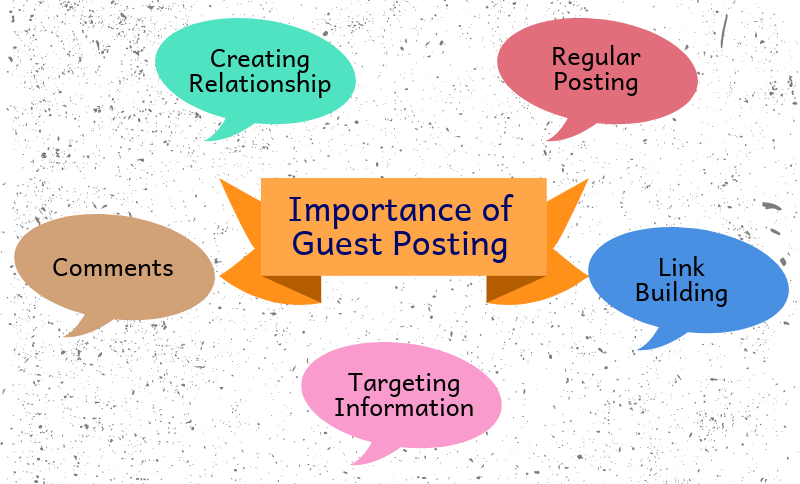If you’re exploring ways to boost your website’s visibility online, guest posting might already be on your radar. But what is guest posting, and how can it help your SEO efforts? Let’s break it down in simple, practical terms.

Guest posting, sometimes called guest blogging, is the practice of writing and publishing content on someone else’s blog or website. This content is usually a well researched and valuable article or post that fits within the theme or audience of the host site. The goal of guest posting isn’t to directly advertise or push your products or services, it’s about contributing something meaningful that helps the audience.
At its core, guest posting is a collaborative effort between the writer and the host site. The writer contributes content that benefits the host’s audience, while gaining exposure and credibility in return. It’s an opportunity to share your expertise, voice and knowledge while connecting with new readers who may not yet be familiar with your brand.
While many might see guest posting as a chance to promote their own products or services, this shouldn’t be the main intent. Overly promotional content can feel like a sales pitch, this can turn off readers and even damage the credibility of both the writer and the host site. A successful guest post focuses on providing value first whether that’s by educating, offering advice, sharing insights or sparking discussion. The best guest posts position the writer as an authority in their field, naturally attracting readers to their website without pushing for a hard sell.
Think of guest posting as an opportunity to create a relationship with a new audience, not just a way to get your brand in front of them. When you write content that’s informative, useful and engaging, readers will be more inclined to visit your website out of curiosity to learn more and this is where the real value lies.
To better illustrate how guest posting works, let’s consider an example with a tackle shop. Instead of writing a guest post that directly promotes the products you sell, for example; fishing rods or tackle boxes, you could write an article about essential fishing gear for beginners or tips on how to maintain tackle for longer use.
By focusing on helpful, practical information like “The Ultimate Fishing Gear Checklist for Beginners” or “5 Tips for Organising Your Tackle Box for Maximum Efficiency,” you provide readers with real value. This helps them solve common problems they face, whether they’re new to fishing or looking to improve their fishing experience.
As a result, readers learn from your expertise without feeling like they’re being sold to. You also introduce them to your tackle shop indirectly, as your article naturally highlights the importance of having good quality, well maintained fishing gear and something you can offer. You might also mention that readers can find these items at your store but that should be secondary to the main goal of offering valuable advice.
In this case, the focus is on building trust with your audience by providing them with useful and actionable content. The indirect promotion of your shop through your expertise will encourage readers to visit your website or check out your shop for their fishing needs without making them feel pressured to buy.
This type of guest posting not only boosts your brand awareness but also establishes you as a trusted resource in the fishing community, all while providing readers with content that genuinely helps them.

Guest posting is one of the most effective ways to boost your website’s SEO (Search Engine Optimisation) and help your site climb higher in search engine results. While SEO involves many different strategies, guest posting plays a unique role in enhancing your site’s visibility and authority.
Here’s how guest posting directly impacts SEO:
One of the most powerful aspects of guest posting for SEO is the opportunity to secure backlinks to your site. Backlinks are simply links from other websites that point back to your own and search engines like Google use them as a major ranking factor. When reputable websites link to your content, they signal to search engines that your site is credible, trustworthy and authoritative.
The quality of the backlinks matters more than the quantity. A single link from a high authority website within your niche is worth much more than multiple links from lower quality sites. By contributing guest posts to well established blogs, you can earn high quality backlinks that will boost your site’s rankings over time. These backlinks also drive referral traffic to your site, giving you an additional source of potential visitors.
Another key benefit of guest posting is brand awareness. When you publish a guest post on another site, you’re exposed to their audience, many of whom may not be familiar with your brand yet. This provides you with the opportunity to introduce yourself to a new group of potential customers or readers.
If your guest post is informative and engaging, it can leave a lasting impression on readers. As they recognise your expertise, they may seek out more of your content or visit your website. Over time, this increased visibility helps strengthen your brand presence online and can attract both loyal readers and potential customers.
Think of guest posting as a form of digital word of mouth. The more well crafted posts you contribute to reputable sites, the more likely people are to recognise your brand and trust you as an authority in your field.
Guest posting is also a powerful networking tool. When you collaborate with other bloggers or site owners, you build relationships that can lead to future opportunities. Whether it’s co-hosting a webinar, cross promoting content, or collaborating on projects, the connections you make through guest posting can expand your reach beyond just one guest post.
These relationships are invaluable because they often lead to additional guest posting opportunities, media mentions, and even joint ventures or partnerships. This network effect can exponentially increase your exposure and further enhance your site’s SEO as more trusted sites link back to you.
In essence, guest posting is a way to become a part of a community within your niche. The more involved you are, the more doors open for you to grow your influence and authority.
When you contribute a guest post to a site that aligns with your niche or industry, you’re attracting targeted traffic and people who are already interested in the topics you cover. This is one of the most valuable aspects of guest posting for SEO. Rather than relying on random visitors, you’re getting people who are likely to find your content, products, or services relevant to their needs.
Targeted traffic not only increases the chances of conversions (whether that’s a sale, subscription, or engagement), but it also reduces your bounce rate. People who come from guest posts are typically more engaged, as they’ve already expressed interest in your subject matter by reading your post. This engagement is another positive signal for search engines, which can further improve your SEO rankings.
Moreover, visitors who find your content helpful are more likely to share it with others, which can amplify your reach even further. As this cycle continues, it compounds your efforts and provides sustained growth for your site’s SEO.
Guest posting isn’t just about writing articles for other websites, it’s a powerful SEO strategy that can significantly boost your site’s visibility and credibility. By securing backlinks, increasing brand awareness, building a network of valuable contacts, and attracting highly targeted traffic, guest posting helps create a robust foundation for long term SEO success.
When you approach guest posting with a focus on providing value and building relationships, you’re not only benefiting your SEO but also creating opportunities for sustainable growth and a stronger online presence. Whether you’re new to guest posting or a seasoned pro, the impact it can have on your SEO efforts is undeniable.

Guest posting is an effective way to build your brand, expand your audience, and improve your SEO, but only when done thoughtfully and strategically. If you want to make the most out of your guest posting efforts, you need to approach the process with care and attention to detail. Here are five key steps to ensure your guest posts are successful:
The first step in guest posting is identifying the right blogs to contribute to. Not all blogs are equal in terms of relevance or impact, so you should carefully select sites that align with your brand, values, and target audience. When you guest post, your content needs to resonate with the blog’s readership, so it’s essential that you choose blogs that are in your niche or related industries.
By choosing the right blogs, you can significantly increase the chances that your post will not only be accepted but also well received by readers.
Once you’ve found a blog that fits, it’s time to pitch your idea. How you approach the blog owner or editor is crucial as being respectful, professional, and clear will increase your chances of getting your guest post accepted.
A thoughtful, well crafted pitch that demonstrates a genuine interest in the blog and its audience will go a long way in building rapport with the site owner and increasing the likelihood of getting your post published.
When it comes to guest posting, content is king. Your post should be well written, informative, and engaging to the blog’s audience. The goal is to provide value through quality content, which is why you should invest time and effort into researching your topic thoroughly.
Remember, the quality of your content reflects on both you and the blog you’re writing for, so take the time to craft a post that you’re proud of.
When writing a guest post, it’s important to include links, but they should be used strategically and naturally. Links help provide additional value to the post and can drive traffic back to your website or highlight other useful resources.
When done correctly, well placed links can enhance your content’s value while also improving your SEO by driving traffic to your website and increasing your site’s backlink profile.
After your guest post is published, don’t just walk away, make an effort to stay engaged with the content and the blog’s audience.
Following up is a crucial step in ensuring that the post has the maximum impact and helps to further strengthen your relationship with the blog’s audience and owner.

Guest posting is a powerful tool for building your online presence, improving SEO, and establishing authority in your niche. However, like any strategy, it’s important to approach it thoughtfully. There are several common mistakes that can undermine your guest posting efforts and even harm your reputation. Here’s a closer look at the mistakes you should avoid:
One of the biggest mistakes you can make in guest posting is being too promotional. While it’s tempting to use the guest post as a platform to sell your products or services, the primary goal should be to provide value to the blog’s audience. If your post reads like a sales pitch, it will likely turn off readers and damage your credibility.
Instead, focus on creating content that educates, entertains, or solves problems for the audience. By offering valuable insights, you build trust with readers, which may lead to more interest in your brand in the long run. The key is to post genuinely helpful content that readers will naturally be curious about to want to go to your brand.
A well crafted guest post should position you as an authority in your field without overtly pushing products or services. For example, a fishing tackle shop might write a guest post on how to select the right fishing gear for specific types of fish, without directly promoting their store. Over time, this can lead to organic interest in your business.
Quality is everything when it comes to guest posting. A poorly written, rushed, or shallow guest post reflects badly on both you and the host site. If your content is difficult to read, lacks depth, or is full of grammatical errors, it can damage your credibility and reputation. The blog owner might even refuse to publish it or remove it after it’s posted, which wastes both your time and theirs.
To avoid this mistake, invest time and effort into researching the topic thoroughly, writing engaging content, and proofreading for errors. A high quality post is not only informative but also engaging, well structured, and free of spelling or grammatical mistakes. Remember that your guest post represents both your personal brand and the blog you’re writing for, so make sure it’s polished.
Additionally, a post that lacks value can frustrate readers. If you’re not offering new insights or useful tips, the audience will quickly lose interest. Therefore, aim to make every post informative, valuable, and well crafted to ensure that readers see you as a knowledgeable and reliable resource.
Another common mistake is using spammy or irrelevant links within your guest post. Links are a critical component of guest posting, especially when it comes to SEO. However, using links inappropriately can actually hurt your SEO efforts and damage your reputation.
By using links responsibly and strategically, you’ll avoid penalties and improve your SEO without compromising the integrity of your content.
Every blog has its own set of guidelines for guest posts, and failing to follow them can hurt your chances of getting published. Whether it’s about the post’s length, tone, or style, adhering to the host site’s guidelines shows professionalism and respect for their editorial process. Ignoring these guidelines can lead to your post being rejected or altered, which wastes your time and effort.
Take the time to review the host site’s guest post guidelines thoroughly. If they have a preferred word count, structure, or tone, make sure you stick to those requirements. Additionally, check if the blog has specific formatting rules for links, headings, or images. By respecting the host’s guidelines, you increase the chances that your post will be accepted and published without unnecessary revisions.
Once your guest post is published, your work doesn’t stop there. Many guest posters make the mistake of neglecting to engage with readers in the comments section or on social media. This missed opportunity can hurt your efforts to build relationships and boost your brand visibility.
Engagement is essential for building credibility and fostering a relationship with the blog’s audience. Respond to questions, thank readers for their comments, and participate in conversations that arise from your post. This shows that you’re genuinely interested in the audience and the topics you’re writing about, which can help solidify your authority and encourage more traffic to your site.
Also, don’t forget to share the post on your own social media channels and mention it in your newsletters. The more you promote the post and engage with readers, the more likely it is to reach a wider audience.

Guest posting is a long term strategy that requires time, effort, and sincerity. When done properly, it can improve your SEO, establish your authority, and expand your audience. The key is to focus on connection, providing value to readers by helping them learn, solve problems, or gain new insights. By prioritising value over self promotion and collaborating with the host blog, guest posting creates mutual benefits for everyone involved: readers, the blog, and your brand. In the end, it’s about fostering meaningful relationships that lead to long term growth and positive impact, making guest posting a powerful tool for lasting success.
Out Ranked Limited.
Nene Business Center, Wellingborough, NN9 5QF.